|
Mediation differs from nearly every other form of dispute resolution because it is non-confrontational. There does not have to be a winner and a loser – both parties can end up as winners because the mediator can help them come to an agreement where they both get some benefit. Unlike litigation or arbitration, the process is not adversarial. It is not necessary to prove that one party is at fault.
The most difficult part of the mediation process is to get people to accept that mediation can be an effective way to resolve their dispute. Most disputes tend to be very personal and some people want their day in court, whatever the cost. Although it may be very natural to want to prove the other party is wrong, the cost of going to court can be prohibitive. Mediation is a much more positive way of finding common ground on which parties can agree and finding the best resolution for both parties. How does mediation work? Once both parties have agreed to mediation, the mediator will talk to both parties separately. The mediator will not disclose any information to the other side without permission. The mediator will work towards guiding the parties to a settlement which can then be set down in the form of a binding agreement. Until that time is reached either party can withdrawn from the process. What are the 4 Models of Mediation ?
How are mediators appointed? It is possible for the parties to agree a mediator. Although it is not essential that the mediator is expert in the subject matter of dispute, sometimes the parties are happier if the mediator is familiar with the subject matter of the dispute. Contact us to provide you with Prime mediators who can advice, represent or act on your cases. How much will mediation cost? There are no set costs and the fee scale can be negotiated with the mediator or our Case Officers can agree them with our mediators if you have a set budget. Normally the parties to a mediation will pay half the mediators fees and pay their own costs. What are the advantages of mediation?
Our panels consist of mediators from all sectors. Contact us for names or either local or international mediators. |
Speak to a Mediator
It’s vital that all parties are entirely comfortable with the choice of mediator. That’s why we encourage people to liaise with our mediators during the selection process. Our Case Officers can put you in touch with a mediator or arrange for any of our mediators to contact you if you would find this helpful. Contact Us |
Mediation
tAKING THE FIRST STEP CAN BE THE MOST DIFFICULT.
|
About Prime Dispute
Prime Dispute / Is a global membership organisation for qualifications and standards in law, dispute avoidance, management & resolution Our purpose / Helping industry create a more prosperous and conflict free working world. Our Vision & Mission |
Please email all correspondence to [email protected]
71-75, Shelton Street, Covent Garden, London, WC2H 9JQ, United Kingdom

